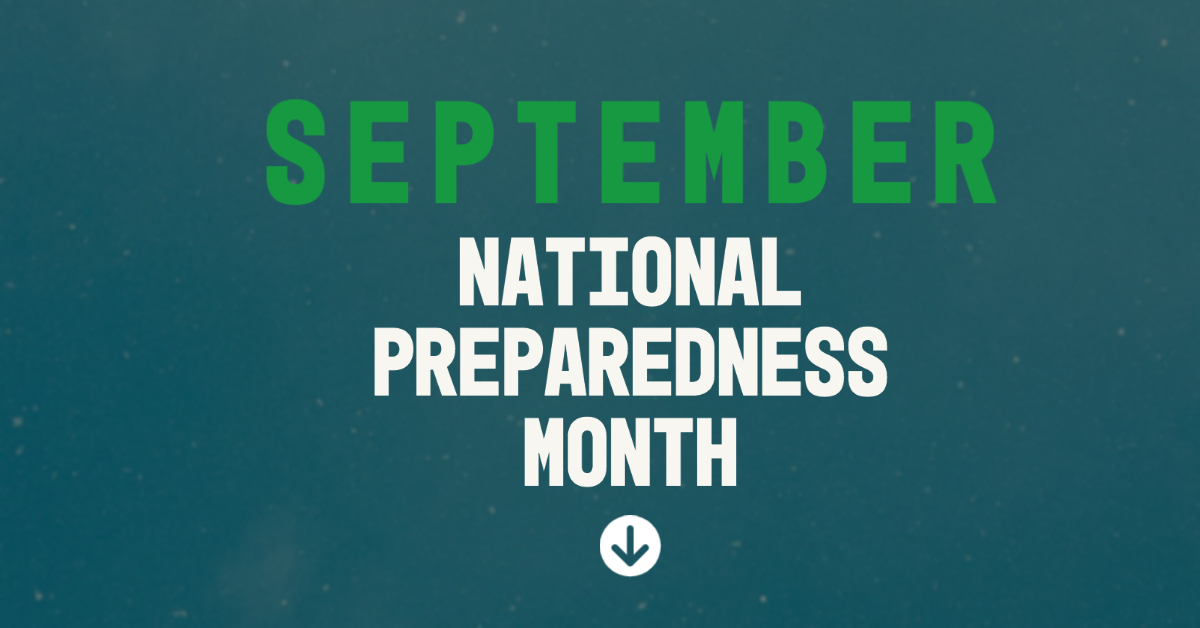Emergency Financial Preparedness Tips
The Department of Homeland Security has designated each September as National Preparedness Month to promote disaster planning for families and communities. This month encourages everyone to plan now, and throughout the year, for possible emergencies.
People from all levels of income experience the hardship of rebuilding their lives after a disaster or emergency. In that stressful time, having access to personal documents including financial, insurance, medical and other records is vital for ensuring that your recovery process can start quickly and easily. Ready.gov notes these important items to remember.
- Ensure that financial and critical personal, household, and medical information are gathered ahead of time, so they are easily accessible in the case of an emergency.
These documents can be stored at home in an appropriately rated safe, or other secured space, such as in a safe deposit box at the credit union. They could also be stored on an external drive or in the cloud for easy access during a disaster.Take some time to review and safeguard these critical documents.
- Keep a small amount of cash at home in a safe place. It is important to have small bills on hand because if power is out ATMs and credit cards may not work when you first need to purchase necessary supplies, like fuel or food.Keeping a small amount of cash at home is important, but more important is creating an emergency savings account. According to the 2018 Federal Reserve report on the economic well-being of U.S. households, “Four in 10 adults (40%), if faced with an unexpected expense of $400, would either not be able to cover it or would cover it by selling something or borrowing money”. Without emergency savings, access to critical supplies may become difficult to obtain. Consider setting money aside in an emergency savings account that could be used in any crisis.
- Purchase health, life, and property (homeowners or renters) insurance if you do not have them.
It is important to remember that not all insurance policies have the same coverage. Review your policy to make sure you have an appropriate amount of coverage and ensure that it covers the requirements for all possible hazards. It can make a huge difference in how you recover from a disaster. One thing many people are not aware of is that homeowners insurance does not typically cover flooding, so you may need to purchase flood insurance from the National Flood Insurance Program- Click here to see more.
Ready.gov has a detailed guide to help you document your property, understand your coverage options, and ensure you have appropriate insurance. Click here to see more.
- You can get your benefits electronically.
Disasters can interrupt the U.S. postal service for days or weeks. If you depend on Social Security or other regular benefits, switching to electronic payments is a simple, significant way to protect yourself financially before disaster strikes. It also eliminates the risk of stolen checks.
The U.S. Department of the Treasury recommends two safer ways to get federal benefits:
- Direct deposit to a checking or savings account. If you get federal benefits you can sign up by calling 800-333-1795 or sign up online.
- The direct express prepaid debit card is also designed as an alternative to paper.
For a more comprehensive plan, check out the Emergency Financial First Aid Kit (EFFACK). This joint publication from Operation Hope and FEMA can help you formulate your financial plan and will provide valuable tips to ensure you are financially secure through a disaster. Click here to see more.
Disasters and emergencies happen, and NorthRidge is dedicated to helping all our members mitigate the financial impact. If you’re looking to open a safe deposit box for your important papers, open an emergency savings account, increase your insurance coverages, or set up your benefits through electronic transfer, NorthRidge has products and services that can help you! Call any of our offices today for more information on what we can provide.
